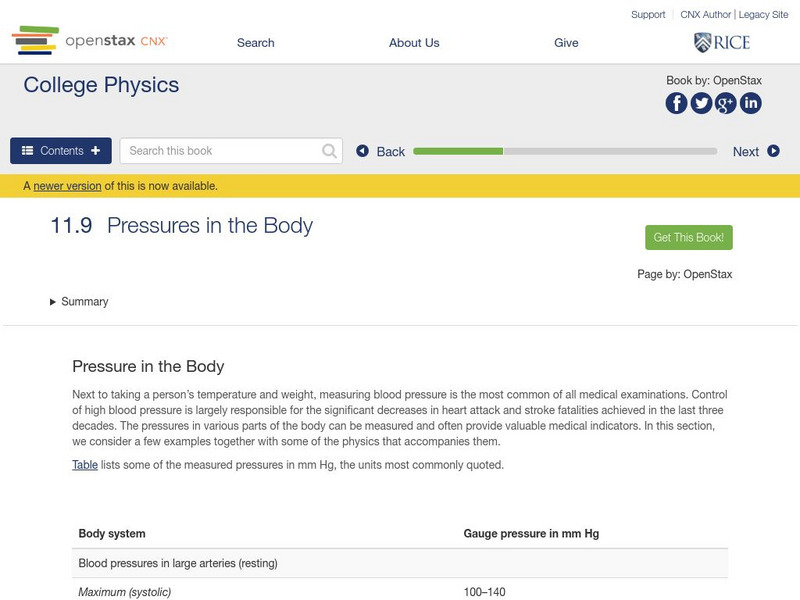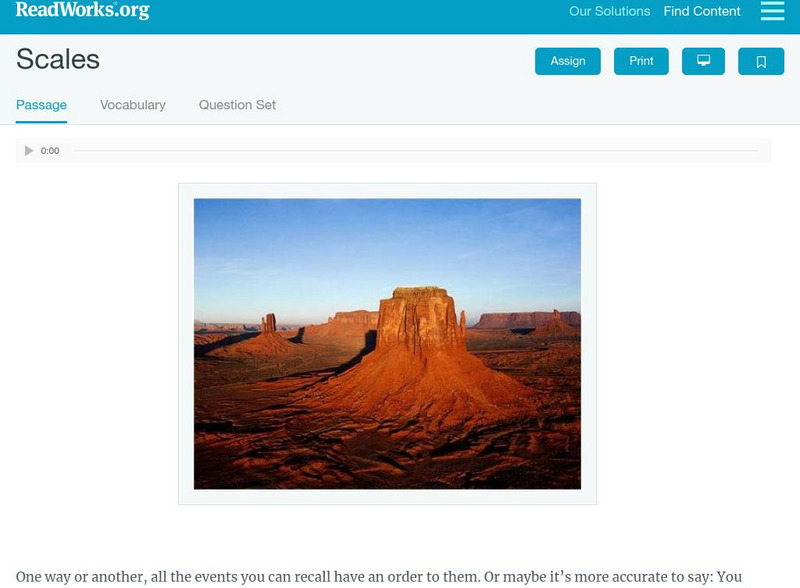Hi, what do you want to do?
University of Washington
The Senses
This site has a collection of learning activities, games, experiments, and lesson plans on the five senses. Organized by grade level and topic, this site is packed with an assortment of interactive and engaging activities, that would...
Scholastic
Scholastic: Study Jams! Science: The Human Body: The Nervous System
A video and a short quiz on the central and peripheral nervous systems.
Curated OER
Artists' Rendering of the Left and Right Hemisperes of the Brain
Artists' rendering of the left and right hemisperes of the brain.
Other
Wisewire: Grade 3 Playlist: Identifying Real Life Connections Between Words
Often, without even realizing it, readers are connecting the words they read to their everyday lives. The human brain is moving so fast that even while reading, behind the scenes, readers are making connections to their real lives and to...
National Cancer Institute at the National Institutes of Health
Seer Training Modules: Introduction to the Nervous System
Self-guided learning activity where students learn about the structure and function of the human nervous system. There is a short quiz at the end of the lesson to check for understanding.
Georgia Department of Education
Ga Virtual Learning: Anatomy and Physiology: Nervous System
Through informational text, interactive activities, self-checking practice problems, and more, students learn about the human nervous system.
Other
Chungara (Arica): Surgical Procedures During Ancient Egyptian Mummification
How did mummification work? Brier and Wade attempt to use primary sources to replicate the mummification process on a human cadaver. Read about how they went about it and whether they were successful.
OpenStax
Open Stax: Pressures in the Body
From a chapter on Fluid Statics in a Physics textbook. This section of the chapter covers the different types of fluid pressures in the human body and how they are measured. Includes problems and exercises.
TeachEngineering
Teach Engineering: What Is a Sensor?
Young scholars gain a rigorous background in the primary human sensors, as preparation for comparing them to some electronic equivalents in the associated activity.
Read Works
Read Works: Scales
[Free Registration/Login Required] An informational text about how the human brain organized past memories. A question sheet is available to help students build skills in reading comprehension.
Curated OER
Human
This site provides a great deal of information about the nervous system. In particular, the tools used to teach about the brain are helpful and effective.
PBS
Pbs: A Science Odyssey
Website for the PBS series "A Science Odyssey." Numerous opportunities to explore the people and discoveries of science.
Other
Aaas Science News: Week of 2 24 14: How Dogs Know What You're Feeling
Article reports on groundbreaking research which looked at brain scans of dogs and discovered that, like humans, their brains have a voice processing center, which helps explain why dogs are so attuned to human emotions.
CPALMS
Florida State University Cpalms: Florida Students: Climbing Around the Hominin Family Tree
Identify basic trends in the evolutionary history of humans, including walking upright, brain size, jaw size, and tool use.
Other
Canal Kids: Saude (Health for Kids in Portuguese)
A very informative and fun site children can use to learn about taking care of their health. In addition to information about the body, the senses, the brain, vaccines, and healthy habits, the site provides a brief history of medicine....
McGraw Hill
Glencoe: Biology: The Nervous System Post Test
A five-question multiple-choice quiz assessing the topic of the central nervous system of the human body.
McGraw Hill
Glencoe: Biology:the Nervous System Pretest
This quick five question pretest will allow students to assess their knowledge of the human central nervous system.
TED Talks
Ted: Ted Ed: Can You Solve the Passcode Riddle?
In a dystopian world, your resistance group is humanity's last hope. Unfortunately, you've all been captured by the tyrannical rulers and brought to the ancient coliseum for their deadly entertainment. Will you be able to solve the...
OpenStax
Open Stax: The Skull
This interactive site provides all kinds of information regarding the human skull.
Other
Get Body Smart: General Organization of the Nervous System
Brought to you by Get Body Smart, students can learn about the human nervous system through this easy-to-access tutorial. Sections include Major Organs and Divisions, Sensory and Motor Divisions, Somatic Divison, Sample Somatic Divison...
PBS
Pbs Kids Design Squad: Supporting Steady Hands
Have you heard of a disease called Parkinson's? When people have this disease they often show signs or symptoms, like shaking uncontrollably. This shaking can make doing simple things harder. Emma Lawton is a person with Parkinson's, and...
CK-12 Foundation
Ck 12: Life Science: 11.43 Peripheral Nervous System
Understand the structure and function of the peripheral nervous system in the human body.
CK-12 Foundation
Ck 12: Life Science: 11.45 Nervous System Injuries
Learn about some injuries to the human nervous system.
TED Talks
Ted: Ted Ed: The Difference Between Classical and Operant Conditioning
Peggy Andover explains how the brain can associate unrelated stimuli and responses, proved by Ivan Pavlov's famous 1890 experiments, and how reinforcement and punishment can result in changed behavior. [4:13]
Other popular searches
- Human Brain Anatomy
- The Human Brain
- Human Brain Diagram
- Human Brain Lessons
- Human Brain Grade 5
- Human Brain Outlines
- Human Brain Worksheets
- Sheep Brain Human Brain
- Human Brain Versus Sheep
- Parts of the Human Brain
- Science the Human Brain
- +The Human Brain




















